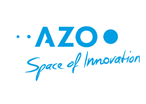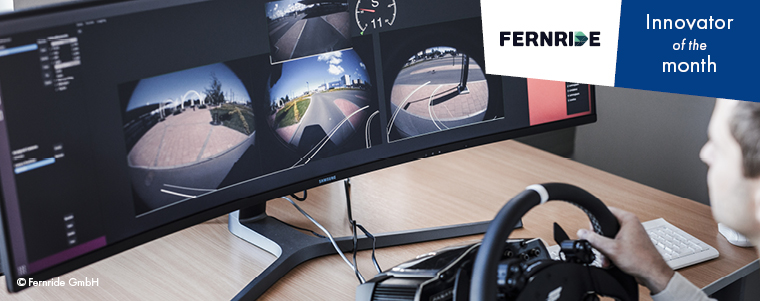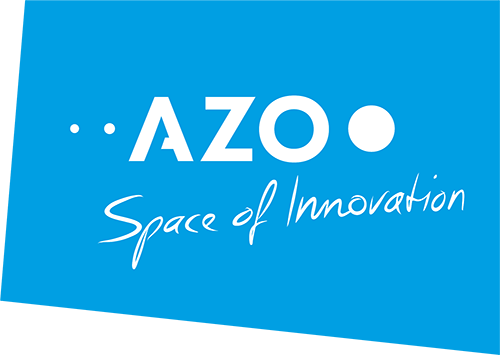Autonomous driving is undoubtedly set to be one of the technologies that dominate our future, with many ambitious projects constantly emerging in the field. However, fully automated vehicles and fleets are still beyond the horizon, as difficult weather conditions and complex situations are raising hard-to-tackle issues for the technology. To take mobility and transportation to the next level, human-machine interaction has to be implemented for increased safety and to optimise the processes.
This is being revolutionised by ESA BIC Bavaria incubatee Fernride. The company provides teleoperation-as-a-service for all steps necessary to realise driverless logistics and mobility processes. The system operates via cellular networks and satellite communications, remote operators are handling fleets of mixed transport vehicles. In the event that the driverless transport vehicle detects difficulties, the teleoperator is able to access a real-time 3D image of the surroundings and give controlling commands. As customers access Fernride’s services on-demand, it offers operating cost benefits of up to 85%.
Since Fernride was founded in 2019, the team has already been able to achieve numerous successes, such as receiving Early-Stage Investments from the Initiative for Industrial Innovators, Fly Ventures and Speedinvest, and being awarded the de:hub Award, the Munich Startup Award at Bits & Pretzels in 2020 and, most recently, the German Mobility Award 2020. In the same year, the team also became part of ESA BIC Bavaria.
Pia Feurstein, ESA BIC Bavaria Project Manager at AZO, interviews Hendrik Kramer, CEO of Fernride.
PF: Please give us a sneak peek of your product and the team behind it.
HK: Fernride offers logistics customers the end-to-end integration of driverless vehicles into their processes. Building on 10 years of research, Fernride is developing the leading teleoperation platform, which allows humans to safely remotely monitor, assist and control vehicles from afar. Fernride is thus redefining the job of the driver, who will evolve from a 1:1 remote operator to a highly effective fleet manager who assists up to 50 highly automated vehicles from the comfort of an office. Partnering with leading OEMs, Fernride enables the remote operation and full automation of driverless fleets – swap body or trailer trucks, forklifts, shuttles, or other vehicles. Founded in 2019 by Hendrik Kramer (CEO), Jean-Michael Georg (CTO) and Dr. Maximilian Fisser (COO), the team has grown to 20 employees over the past 1.5 years with senior engineering expertise in all relevant domains such as video streaming, 3D imaging, vehicle integration and teleoperation. I founded my first company at the age of 16 and studied autonomous driving and entrepreneurship at TU Munich and Stanford. Jean-Michael did his PhD in teleoperation at the leading chair for autonomous driving at TU Munich. Max holds a PhD in distributed sensor systems and was a fellow of the exclusive Entrepreneur First programme in Berlin.
PF: What has been your company’s biggest challenge so far?
HK: We are currently focusing on driverless logistics. There exists a great variety of other possibilities and requests to implement driverless vehicles in applications in mobility, agriculture, or mining. As a start-up, however, you only have limited resources, and you must focus them on the most promising use case and not get bogged down in too many different projects. We are overcoming this challenge with a very analytical approach and a clear strategy regarding the timing of the different use cases, based on “first principles” in technology. Some applications are not yet possible today due to technical progress, but the industry is under pressure to bring innovative solutions to market – especially due to aggressive marketing by players like Tesla. We are building our platform in a modular way: With advances in sensor technology and by progressing the expansion of the mobile network, we can serve the right markets at the right time. For these reasons, we are currently concentrating on applications on private property with manageable complexity.
PF: Can you explain the three main ingredients of your recipe for success?
HK: An analytical, data-driven mindset. A strong and diverse team which is driven by a burning passion to achieve our vision of a driverless future. A strong network of great partners and support, like the ESA BIC community, for example.
PF: Did the Covid-19 outbreak have any effects on your business and/or are you expecting any impacts in the future?
HK: Since we work closely together with vehicle manufacturers and our logistics customers, we can certainly see the impact the crisis has had on them. However, we are very well equipped to deal with the crisis and do not feel any major repercussions ourselves – both professionally and, thankfully, as individuals. Everyone who can work from home is working from home and this is working great for us.
PF: What do you expect from ESA BIC Bavaria and how do you think the initiative and its network will help you to kick-start your business case?
HK: During our incubation period (mid-2020 to mid-2021), we are mainly focusing on product development and the incentive by ESA BIC is supporting our efforts in hardware and software development as well as IP protection measures. For example, concerning the development of the communication layer at Fernride, we see great value in ESA’s expertise in the field of space technology and telecommunications. While the prototype is already able to work under LTE and 5G, any development of additional connectivity (e.g. internet satellites) may provide high added value to the product for customers. Beyond tech-related support, the access to the great network of ESA gives us the opportunity to realise training or coaching sessions on refining the product market fit, pricing, PR, and B2B marketing and sales.
PF: What do you think to benefit from the DLR support?
HK: We think we can most benefit from the DLR’s expertise in the development of safety-critical applications and redundant connectivity through the space connection.
PF: Let’s reach for the stars – what is going to happen in Fernride’s future?
HK: We are going to build a European Tech Champion in driverless vehicles that will pave the way for the development from teleoperation to fully autonomous driving across industries. As a result, Fernride will enable a future where accidents, emissions, wasted time and inequality in road traffic are a thing of the past.





Comments are closed.